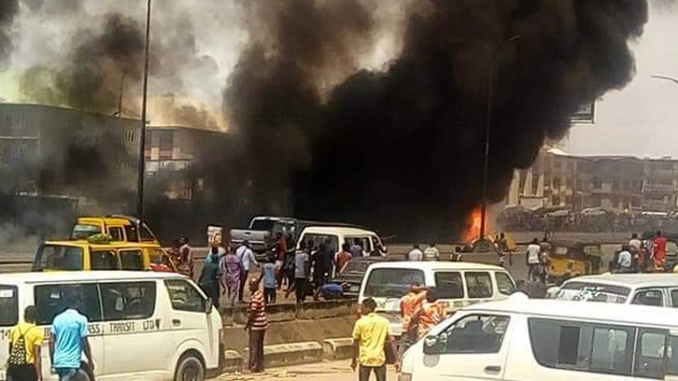
The inferno on Wednesday in Ochanja Market Onitsha again brought to the fore our disaster unpreparedness. With no fire brigade on the hand to control the fire in the acclaimed largest market in West Africa, billions of naira became ashes within minutes. By the time the fire brigade from neighbouring Delta State could arrive, there was little or nothing to save.
But this is not the first time such is happening. For some of us who grew up in the commercial city of Aba, it was déjà vu all over again. Many times, in the 1980s and 1990s, some sections of the Ariaria International Market were razed by fire –despite Aba having two fire service stations, one in the market and another in Constitution Crescent. We would always learn later that the fire service stations had no water and thus were helpless.
In those days, help always came from the fire service in Owerri. With good road, Owerri to Aba is about 45 minutes’ drive and over an hour on bad roads. Given that the road has been largely bad since the late 1980s, you will appreciate the damage a raging fire will cause in Ariaria before help will come from Owerri.
But sometime in the early 1990s when a section of Ariaria was flattened by fire and the usual thing happened, Aba residents got angry and burnt down the two fire service stations in the city. To them, since the stations served no purpose, there was no need to still have them. I do not know whether these fire service stations have been rebuilt today.
The population of Aba has kept growing over the years, with many new suburbs emerging in all its cardinal points. Yet, I have never heard of a new fire service station built anywhere in the city.
This seems to be the case across Nigeria. For instance, in Owerri, Imo State, it appears that the fire service station on the Wetheral Road/Egbu Road Intersection is the only one serving the entire state capital and adjoining towns and communities save for the decrepit structures serving as fire stations in Orlu and Okigwe. Many new suburbs have sprung up since that station was built, and the population of the city has also tripled since then, yet no new fire service station has been built in the city.
In Uyo, Akwa Ibom State, the story is similar. The city’s population has increased tremendously since 2004. From a seemingly glorified village, the city has become one of the most beautiful in the country, with new suburbs springing up everywhere. Unfortunately, the city, it appears, is serviced by only one fire service station – the one in Dominic Utuk Avenue, Uyo.
Remember the Sosoliso Airlines Flight 1145 which crashed in Port Harcourt on December 10, 2005? Over 100 lives, mostly students of Jesuit College, Abuja, were lost just because the fire service at the Port Harcourt International Airport, Omagwa, had no water. Before the fire service at Shell Camp could arrive, almost all of the 100 of our compatriots were gone.
Time and time again, we have had petrol fires kill scores, still, the authorities do not see the need for having a functional fire service and ensuring that stations are built within a certain radius, as the norm is in climes where leaders are responsive to the people they govern.
As a matter of fact, the job of the fire service goes beyond putting out fire. They are part of larger emergency services and are also involved in all kinds of rescue operations. In the United Kingdom, they are called the Fire and Rescue Service. Their duties and responsibilities, according to the 2004 Fire and Rescue Act, are: Extinguishing fires in their area; protecting life and property in the event of fires in their area; rescuing and protecting people in the event of a road traffic collision; and rescuing and protecting people in the event of other emergencies.
Imagine the number of lives that would be saved in Nigeria if every local government had a functional fire service; if a fire station is built to serve a cluster of three suburbs in large cities.
Anyhow, the Senate President, Ahmed Lawan, said we should pray more to overcome challenges –which include containing fire emergencies.
Nnaemeka Meribe
Melbourne, Australia
END

Be the first to comment